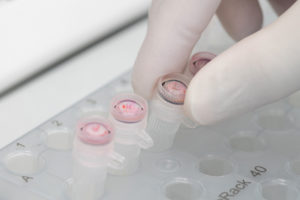Ulm virologist Professor Frank Kirchhoff has been awarded an ERC Advanced Grant by the European Research Council. Over the next five years, the scientist from Ulm University Hospital will receive 2.3 million euros to uncover previously unknown endogenous antiviral defence mechanisms. For this purpose, so-called “traitor viruses” are to be generated and used, which will show the researchers which cellular factors inhibit them most effectively. The basis for this is a combination of modified HI viruses with CRISPR/Cas9 technology.
Viruses are masters of adaptation. They use the evolutionary principle of trial and error with enormous efficiency. “What makes pandemic viruses like HIV-1 and SARS-CoV-2 so successful is their rapid multiplication and high variability and the associated ability to undermine human immune defences,” explains Professor Frank Kirchhoff, head of the Institute of Molecular Virology at the University Hospital Ulm. For the second time since 2012, the virologist from Ulm has succeeded in acquiring one of the highly coveted ERC Advanced Grants. The funding, worth millions – 2.3 million euros are available for the next five years – is intended to help systematically uncover previously unknown, endogenous antiviral defence mechanisms. Kirchhoff was supported in his second application by Caterina Prelli Bozzo, Alexandre Laliberté and Dr. Konstantin Sparrer, who also conduct research at the Institute of Molecular Virology.
A key role in the defence against viruses is played by a special part of the human immune system, the so-called innate immune response. This comprises a large number of cellular proteins whose activation usually effectively protects against viral infections. These endogenous, antiviral proteins show an enormous structural and functional diversity. However, particularly “successful” viruses, such as HIV and SARS-CoV-2, can bypass or switch off many of these defence mechanisms.
However, which factors remain effective in the event of a viral attack and thus prevent severe infections in most cases is still poorly understood. As part of the ERC project “Traitor-virus-guided discovery of novel antiviral factors”, the Ulm researchers now want to systematically and comprehensively elucidate which of the body’s own proteins can effectively attenuate viral pathogens – including pandemic pathogens. The scientific approach to this is new and promising. Kirchhoff and his colleagues have already succeeded in equipping HI viruses with specific “gene scissors” such as CRISPR/Cas 9 in such a way that they can eliminate their cellular “opponents”, but at the same time reveal who these opponents are in the first place. “We thus turn them into ‘traitor viruses’ that tell us which of the body’s own proteins inhibit the multiplication and spread of the viruses,” Prelli Bozzo and Laliberté explain.
To systematically identify cellular counterparts of viruses, libraries of replicable HIV constructs expressing a large number of different so-called ‘guide RNAs’ are produced. In the presence of the Cas9 protein, which is actually only found in bacteria, these ‘guide RNAs’ can inactivate specific cellular genes. Viral variants that produce guide RNAs that are able to switch off antiviral genes have a selection advantage. This is because they eliminate effective immune factors. Those viral variants that reproduce best in cell culture tell scientists which cellular genes are most important for antiviral control. These cellular factors are then specifically investigated further and characterised with regard to their antiviral mechanism and spectrum of effect.
In the future, Kirchhoff and his colleagues hope to be able to better prevent the spread and development of viral zoonoses through the discovery of important defence mechanisms. “If we know more about our innate defence mechanisms, we should be better able to strengthen them in a targeted way to more effectively ward off or control viral pathogens,” says Frank Kirchhoff. Over the next five years, the Ulm researchers are now working on putting this innovative and versatile approach into practice. The long-term goal: to develop new approaches for the prevention and therapy of viral diseases by uncovering antiviral defence mechanisms.
Background ERC Advanced Grant
The European Research Council (ERC), founded by the European Commission, is the most important European funding institution for basic research. The ERC’s most important funding programmes include Starting, Consolidator, Advanced and Synergy Grants. The ERC Advanced Grant is aimed at experienced top researchers with more than 10 years of research experience who already play a formative role in their field of research. The duration of the funding is 5 years and the funding amount is usually up to 2.5 million euros.
At the end of 2012, Prof. Frank Kirchhoff was already awarded an ERC Advanced Grant of 2 million euros. The focus was on the question of which adaptations to humans enabled HI viruses to cause the AIDS pandemic.

